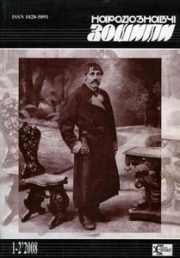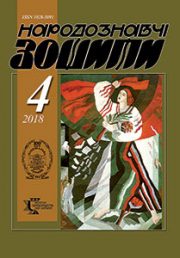The Ethnology Notebooks. 2019, 2 (146), 492—494
UDK 39:94](=161.2:71)”20″
DOI https://doi.org/10.15407/nz2019.02.492
UKRAINIANS IN MODERN CANADA: THE ISSUE OF HISTORICAL AND CULTURAL MEMORYTYPOLOGY
YATSIV Roman
ORCID ID: https://orcid.org/0000-0003-1509-5367
Vice-rector on the scientific work,
The Lviv National Academy of Arts,
Ph.D., professor, Honored Worker of Culture of Ukraine,
38, Kubiiovycha Str., 79011, Lviv, Ukraine.
Contacts: e-mail: jaciv@ukr.net
Abstract. The problem under consideration is related to the article by Patricia Teszczyńska «Ukrainians from Poland in Canada: between the Ukrainian and Polish Diaspora». While appraising the relevance of the author’s studio, the attention should be drawn to some kind of narrowing of the academic discourse on issues of historical and cultural memory. The methodology for socio-cultural anthropology used by the researcher (interviewing and «included observation») allows a fragmentary (rather than a holistic) representative sample of self-identification by Canadian Ukrainians who left Poland in different emigration waves and today live in the Ukrainian communities of Canada. Accordingly, a set of examples, and later analytics with conclusions can not cover a broad background and various factors within it that have, to some extent, influenced the public consciousness of the carriers of ethnic identity.
Our observations are intended to fill some of the gaps, Patricia Teszczyńska failed to avoid, in an attempt to track the «power fields» of the memory stored in the families of Ukrainians who moved to Canada from Poland. The opportunity to visit Toronto in the spring of 2017 on the opening of the author’s exhibition of painting helped to communicate with individual families, whose history is also connected with this group of emigration. Accordingly, in these family environments, historical and cultural memory has somewhat different value-semantic configurations which allows them to more clearly articulate their genetic ethnic roots.
The subject of the study is the family traditions and behavioral patterns of a group of Canadians of Ukrainian origin who are active in the socio-cultural processes of modern Canadian cities and identify themselves as Ukrainians. The subject of the study is historical and cultural memory, which manifests itself at various levels of socio-cultural life in the complex of their signs. The methodological basis of the research is the cultural-anthropological approach, with the involvement of ethnopsychological studies and author’s interpretation of behavioral models of the selected typological group.
The purpose of the study is an attempt to deepen the scientific discourse, initiated by the researcher of this topic Patricia Teszczyńska. An indispensable condition for the correctness of the conclusions regarding the nature of historical, cultural and emotional memory is the implementation of the typology of identity carriers — both according to the social, tribal, and family-household scale. The basis of the work is the material collected by the author during his stay in the community of the Ukrainian diaspora of Canada (Toronto and Ottawa) in the spring of 2017.
Keywords: Canada, Ukrainian diaspora, Ukrainians from Poland, historical and cultural memory, ethnic and national identity, cultural consciousness, cultural institutions.
Received 19.03.2019





